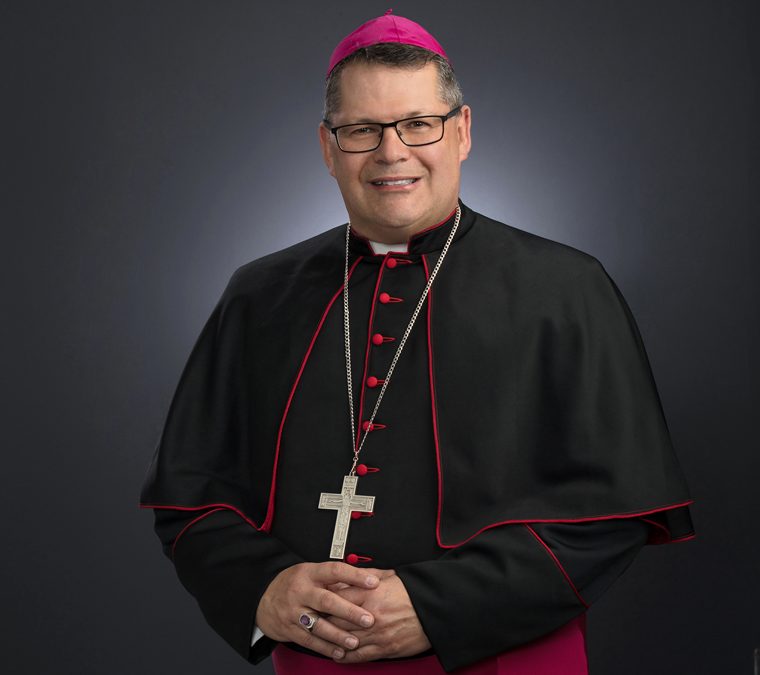Bishop Douglas J. Lucia celebrated the Diocese of Syracuse Catholic Schools Baccalaureate Mass at the Cathedral of the Immaculate Conception June 11. An excerpt of the homily he preached on that occasion appears below.
Dear brothers and sisters, it is so good to welcome you tonight to this Cathedral church! I must admit, after having celebrated Mass in this Cathedral for almost 12 weeks with nobody filling the pews, it is a great privilege to have you here tonight.
As I mentioned at the beginning of our liturgy, we are here for a Baccalaureate Mass. Since I have a fondness for the dictionary, I must admit I looked up “baccalaureate” to see what is behind this word. I was struck that it is of a singular purpose. It is all about “moving forward,” whether in terms of an exam, degree, or a farewell sermon on the occasion of Commencement Exercises.
With this in mind, I thought: What would be tonight’s farewell sermon? And if I had to say it in a nutshell, particularly on this Memorial of St. Barnabas the Apostle, it would be: “Preach the Gospel at all times and if necessary, use words.”
This particular saying has been attributed to St. Francis of Assisi. But what does it mean to preach the Gospel without words? Well, if we think of Pope Emeritus Benedict XVI, when he talked about the Gospel, he spoke about the Gospel not so much being a message as being a person — the person of Jesus Christ. And so, to preach the Gospel meant to really be like Christ, to radiate Christ,x to those around us.
This leads us to today’s Memorial of the Apostle Barnabas, who was known not only for his preaching, but even more his living of the Gospel. In fact, he is referred to as a “son of encouragement.” What would that mean for you and me if we were to be sons and daughters of encouragement and let the Gospel of Jesus Christ speak through our actions? Hopefully, it’s reflected in our words, but in your time at school I think you might agree also that — what is the best way we learn? Is it necessarily everything you read, or rather the example we are given? And that’s my challenge for you and for me and for all of us gathered here tonight: to be that living Gospel for all people to hear.
Our Gospel tonight, which speaks about how we should treat one another, how we should reach out to one another, and how we should forgive one another, is all part of the Sermon on the Mount found in the fifth chapter of the Gospel of Matthew. This evening, we heard proclaimed verses 20-26. Well, just a couple of days ago verses 13-16 were read, which come right after the Beatitudes, and what they proclaimed was simply, “YOU are the salt of the earth, YOU are the light of the world.” In other words, those Beatitudes that Jesus speaks about, if they’re to be known, if people are to understand them — like “Blessed are the peacemakers for they will be called sons and daughters of God” (5:10) — the way that Gospel comes alive, the ways those words of God come alive, is the way you and I enflesh them, the way you and I let them shine forth and season our lives.
And so, for me, that is what it means to preach the Gospel; to preach the Gospel at this time of commencement — which of course means beginning. It’s not the end of something; it’s really the beginning of something for our graduates. And that beginning is to literally take the word that they have come to learn, to know, and to let that word come alive through them. That’s what Barnabas did! He took the Gospel, and in preaching the Gospel to the nations he let it come alive in himself. Even to the point that he and his companion Paul (Barnabas had taken Paul under his wing after Paul’s conversion)… had a disagreement over John Mark, another disciple of the Lord. Barnabas doesn’t want to give up on John Mark, but Paul does. He has had enough of his company.
So, what the two apostles do in that moment is part company. You know what is interesting? Even in their parting company, it’s not like you might imagine. There was no screaming at each another or putting one another down. It was rather Barnabas deciding he had to take John Mark with him. Paul, too, decided he had to continue his missionary journey; it would now just take him and Barnabas on different paths, but still the same Gospel! It wasn’t with hate words, it wasn’t with what we call “mudslinging,” and in fact, even though they disagreed, it did not dismiss their love and respect for each other. How we know this is that Paul talks of Barnabas and the love and respect he had for Barnabas in his letter to the Corinthians. Think about that! Think about how the Gospel is meant to shape our lives! It is not something that we can just say, “Well, I learned it.” It is not something that we can hold up, like me holding up the Book of the Gospels and saying “oh, the Gospel of the Lord” — but what does that mean, if I don’t live the Gospel?
So dear sisters and brothers, tonight as we gather for this Baccalaureate, this sending forth, the apostle Barnabas is our model. Barnabas is asking you and I, “How can we also help others know Jesus Christ?” And again, just like with any learning — like the day I was ordained a priest or ordained a bishop — I didn’t know everything despite my education. I knew I had to learn even more, and where you and I learn more is by journeying with Jesus.





